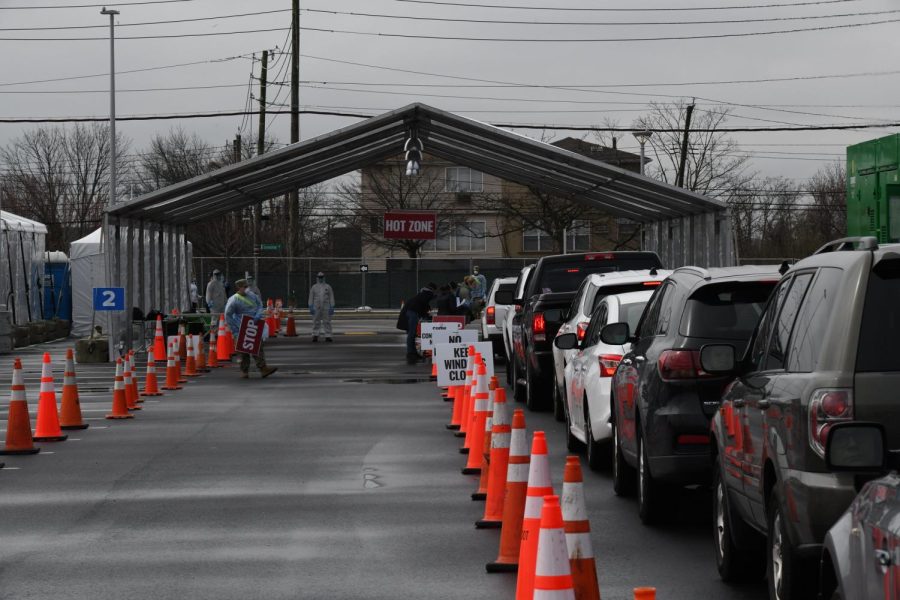Opinion | Omicron variant exposes COVID-19 testing inequality
Photo courtesy of Maj. Patrick Cordova/New York National Guard/Flickr
Vehicles line up for a drive-through COVID-19 testing center at Staten Island on Mar. 19, 2020. Columnist Aparna Lakkaraju believes that with the recent rise in COVID-19 it shows the unequal treatment for those with less accessibility to testing.
January 27, 2022
With the anticlimactic debut of the spring semester, many students are once again faced with a harsh reality — the pandemic is still not over. Given the rapid rise in cases nationwide due to the highly contagious omicron variant, the University’s announcement that the first week of the semester would be remote did not come as a shock to many.
The surge in cases from the omicron variant, which can easily spread to vaccinated populations, has led to many universities requiring that students get off-campus tests before they return to campus. Due to exploitative price-gouging, many college students around the country are paying hundreds of dollars to return to campus after winter break. This cost is outrageous for a service that should be free and easily accessible to all during a global pandemic.
The University has implemented many preventative measures, in addition to temporarily going remote. For example, a negative coronavirus test is required by the end of the first week to gain building access. The measure requiring off-campus testing was omitted which came as a relief to many students who lack access to reliable and inexpensive testing outside of the University.
Although the University’s free testing system is streamlined, with easy accessibility and quick results, this is not the case for the rest of the nation.
Many reliable sources for free testing, such as pharmacies and state testing sites, are being overloaded with appointments and are running out of supplies. As a result, appointments can only be made days in advance, preventing exposed individuals from getting tested on time and forcing them to quarantine for more days than necessary. This lost time affects the livelihoods and education of students.
Get The Daily Illini in your inbox!
The swell in demand for accessible testing is also contributing to an increase in the distribution of fraudulent testing, which can range from fake at-home rapid tests to unregulated or unlicensed testing pop-ups. These pop-ups have the potential to steal confidential consumer information, provide inaccurate test results and price-gouge in the process.
Economic standing is also a major factor for testing accessibility. Many testing sites offer quick, reliable results — for a steep price. Independent pharmacies are taking advantage of this surge in testing demand to make absurdly high profits by upselling tests bought in bulk by up to 200%. Price gouging creates yet another barrier for economically disadvantaged populations that cannot afford to fork out hundreds of dollars at will for coronavirus testing.
The government is attempting to increase testing accessibility by shipping free at-home coronavirus tests and demanding that private insurers cover eight at-home coronavirus tests every month. However, these at-home tests will not reach households until the end of January.
The government’s self-testing kit distribution is a good starting point, but more efforts should be made to prevent businesses from exploiting ill individuals. Similar to price caps on prescription drugs and laboratory tests, laws should be passed to prevent businesses from price-gouging rapid and PCR tests.
Price-gouging has been a problem since the beginning of the pandemic — when toilet paper was the hottest commodity — and has continually affected access to necessities. Coronavirus testing is a crucial step in returning to normalcy, particularly for students that have been dealing with the negative consequences of isolation over the past two years.
Failure to increase accessibility to testing could prolong the pandemic and hinder existing progress. Especially since the transmissibility of the omicron variant leaves the entire population vulnerable to infection, everyone deserves the right to test equally.
Aparna is a freshman in LAS.







